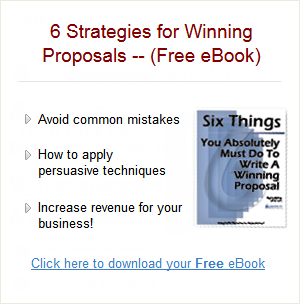What's the Purpose of Your Proposal?
Here’s a pop quiz. A proposal is:
A. A technical document
B. A marketing document
C. A sales document
D. All of the above
When I ask this question in the proposal classes I teach, I get a variety of answers. The technical people sometimes select A; after all, to them the purpose of a proposal is to explain a technical solution to a client’s problem. Some of the technical folks and most of the marketing people choose B. They see the proposal as a way to market the services the firm offers. A few people choose D. They see the proposal as a marketing document that features a technical solution that the client will buy.
Very few select C. Yet, that’s exactly what a proposal is—a sales document. If you treat it as anything else, you risk not achieving the objective of the proposal, which is to convince the client that she ought to award the contract to you. Or, in other words, to buy the product or service you are selling.
The Proposal as a Technical Document. If you treat the proposal as if it is mainly a technical document, you will spin out all sorts of technical specifications and jargon—stuff that the client is simply not interested in at this stage. You will focus on technical details without linking them to specific needs the client has in wanting those details. And the document will likely read like a technical report, which can be the kiss of death.
The Proposal as a Marketing Document. Marketing is pre-selling. It’s the stuff you do before you submit a proposal. It includes direct mailing brochures to potential clients, advertising in trade journals, and visits to the client’s shop. It includes phone calls and meetings with the client in which you learn of her needs and offer solutions. Marketing even includes the Statement of Qualifications you submit in response to a client’s RFQ. It can even include your technical reports (see above) if you are marketing to a client you already have.
Marketing is the process of influencing the client in your direction. When you market the client, you are priming her for the sale. It does not include the proposal.
The Proposal as a Sales Document. The proposal is when you make the sale. When the client issues a solicitation or call for proposals, she signals that she is ready to buy. Until then, she’s been shopping.
Your proposal is a sales tool. It’s where you present the strongest, most compelling arguments for selecting your firm, in the form of clear and direct benefits to the client. In your proposal you present your solution to what you have learned over the marketing phase about what the client needs and wants. In the marketing phase you have tried to persuade the client that you have the skills and the ability to bring them to bear on the job. In the proposal you must make the sale.
If you treat the proposal as a marketing tool, you’re still trying to prime the client when she is past the stage where she needs to be primed. She wants to buy. If you treat the proposal as a technical document you are giving the client too much data when she has no interest in digesting it. She wants to buy.
Writing a winning proposal means that you use the right tools at the right time for the right purpose. And when the client is ready to buy, you need to be ready to sell.

